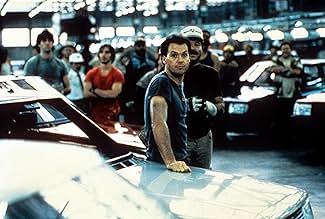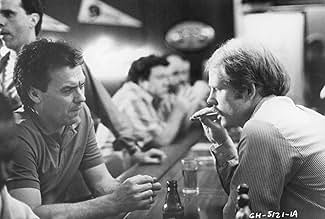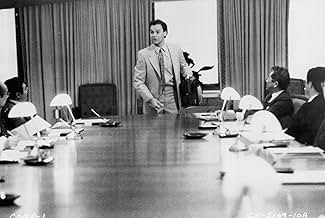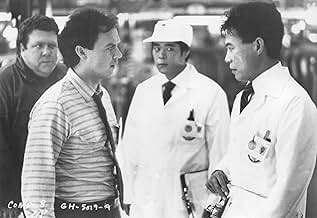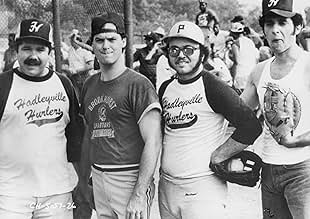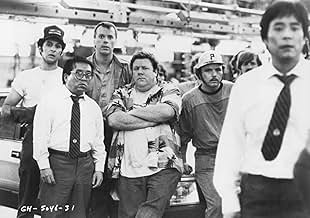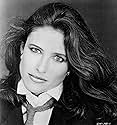CALIFICACIÓN DE IMDb
6.3/10
14 k
TU CALIFICACIÓN
Cuando una empresa de automóviles japonesa compra una planta estadounidense, el enlace estadounidense debe mediar en el choque de actitudes laborales entre la dirección extranjera y la mano ... Leer todoCuando una empresa de automóviles japonesa compra una planta estadounidense, el enlace estadounidense debe mediar en el choque de actitudes laborales entre la dirección extranjera y la mano de obra nativa.Cuando una empresa de automóviles japonesa compra una planta estadounidense, el enlace estadounidense debe mediar en el choque de actitudes laborales entre la dirección extranjera y la mano de obra nativa.
- Premios
- 1 premio ganado en total
Sô Yamamura
- Mr. Sakamoto
- (as Soh Yamamura)
Patti Yasutake
- Umeki Kazihiro
- (as Patti Yasuiake)
Argumento
¿Sabías que…?
- TriviaAccording to Bloomberg Businessweek, Toyota executives later used the movie as an example of how not to manage Americans.
- ErroresWhen Hunt Stevenson meets the Japanese managers for the first time, they hand their business cards over with one hand. Japanese business protocol requires formally presenting business cards, holding them with both hands.
- Citas
Hunt Stevenson: Afterwards, we have a few beers and piss for distance.
Oishi Kazihiro: For us, it's accuracy.
- Versiones alternativasSome international editions distributed by Paramount on DVD, reduced the aspect ratio from original 2.39:1 to 2.09:1.
- ConexionesFeatured in Generation X: The Power of Disruption (2016)
- Bandas sonorasDon't Get Me Wrong
Written by Chrissie Hynde
Performed by The Pretenders
Produced by Jimmy Lavine and Bob Clearmountain
Courtesy of Sire Records Company
Opinión destacada
Way, way back in the 1980s, long before NAFTA was drafted and corporations began to shed their national identities, the United States and Japan were at each other's throat in the world manufacturing race. Remember sayings like 'Union Yes!,' 'the Japanese are taking this country over,' and 'Americans are lazy?'
As the Reagan era winded down and corporations edged towards a global marketplace, director Ron Howard made one of several trips into the comedy genre with his 1986 smash 'Gung Ho,' which drew over $36 million in U.S. box office receipts. While in many ways dated, Howard's tongue-in-cheek story of colliding cultures in the workplace still offers hard truth for industrial life today.
'Gung Ho' focuses on Hunt Stevenson (Michael Keaton), the automakers union rep from Hadleyville, a small, depressed town in the foothills of Pennsylvania. Stevenson has been asked to visit the Assan Motor Company in Tokyo (similar to real-life Toyota), which is considering a U.S. operation at the town's empty plant. With hundreds of residents out of work and the town verging on collapse, Assan decides to move in and Stevenson is hired as a liaison between company officials and workers on the assembly line.
The 112 minutes of 'Gung Ho' is a humorous look at these two sides, with their strengths and weaknesses equally considered: on one hand, an American workforce that values its traditions but is often caught in the frenzy of pride and trade unionism; on the other hand, Japanese workers who are extremely devoted to their job yet lacking in personal satisfaction and feelings of self-worth. In Stevenson, we find an American working class figure of average intelligence with the skills to chat people through misunderstandings. With the survival of his workers' jobs and most of Hadleyville on the line, Stevenson proves a likable guy who wants nothing more than a fair chance, although his cleverness will sink him into a great deal of trouble. Besides answering to the heads of Assan, we witness a delicate balancing act between Stevenson and his fellow union members, many of whom he grew up with. This includes Buster (George Wendt), Willie (John Turturro), and Paul (Clint Howard, Ron's brother).
The Japanese cast is headed by Gedde Watanabe, also known for 'Sixteen Candles' and 'Volunteers.' Watanabe plays Kazihiro, the plant manager who is down on his luck and begins to feel a sympathy for American life. He is constantly shadowed by Saito (Sab Shimono), the nephew of Assan's CEO who is desperate to take his spot in the pecking order. While given a light touch, these characters fare very well in conveying ideas of the Japanese working culture.
With Hunt Stevenson dominating the script, Michael Keaton has to give a solid performance for this film to work. 'Gung Ho' is indeed a slam-dunk success for Keaton, who also teamed with Ron Howard in 1994's 'The Paper.' He made this film during a string of lighter roles that included 'Mr. Mom,' 'Beetle Juice,' and 'The Dream Team' before venturing into 'Batman,' 'One Good Cop,' and 'My Life.' It's also hard not to like Gedde Watanabe's performance as the odd man out, who first wears Japanese ribbons of shame before teaming up with Stevenson to make the auto plant a cohesive unit.
The supporting cast is top-notch, including Wendt, Turturro, Shimono, and Soh Yamamura as Assan CEO Sakamoto. Mimi Rogers supplies a romantic interest as Audrey, Hunt's girlfriend. Edwin Blum, Lowell Ganz, and Babaloo Mandel teamed up for Gung Ho's solid writing. The incidental music, which received a BMI Film Music Award, was composed by Thomas Newman. Gung Ho's soundtrack songs are wall-to-wall 80s, including 'Don't Get Me Wrong,' 'Tuff Enuff,' and 'Working Class Man.'
The success of 'Gung Ho' actually led to a short-lived TV series on ABC. While more impressive as a social commentary twenty years ago, Ron Howard's film still has its comic value. It is available on DVD as part of the Paramount Widescreen Collection and is a tad short-changed. Audio options are provided in English 5.1 surround, English Dolby surround, and French 'dubbing,' but subtitles are in English only. There are no extras, not even the theatrical trailer. On the plus side, Paramount's digital transfer is quite good, with little grain after the opening credits and high quality sound. While a few extras would have been helpful - especially that 'Gung Ho' was a box office success - there's little to complain about the film presentation itself.
*** out of 4
As the Reagan era winded down and corporations edged towards a global marketplace, director Ron Howard made one of several trips into the comedy genre with his 1986 smash 'Gung Ho,' which drew over $36 million in U.S. box office receipts. While in many ways dated, Howard's tongue-in-cheek story of colliding cultures in the workplace still offers hard truth for industrial life today.
'Gung Ho' focuses on Hunt Stevenson (Michael Keaton), the automakers union rep from Hadleyville, a small, depressed town in the foothills of Pennsylvania. Stevenson has been asked to visit the Assan Motor Company in Tokyo (similar to real-life Toyota), which is considering a U.S. operation at the town's empty plant. With hundreds of residents out of work and the town verging on collapse, Assan decides to move in and Stevenson is hired as a liaison between company officials and workers on the assembly line.
The 112 minutes of 'Gung Ho' is a humorous look at these two sides, with their strengths and weaknesses equally considered: on one hand, an American workforce that values its traditions but is often caught in the frenzy of pride and trade unionism; on the other hand, Japanese workers who are extremely devoted to their job yet lacking in personal satisfaction and feelings of self-worth. In Stevenson, we find an American working class figure of average intelligence with the skills to chat people through misunderstandings. With the survival of his workers' jobs and most of Hadleyville on the line, Stevenson proves a likable guy who wants nothing more than a fair chance, although his cleverness will sink him into a great deal of trouble. Besides answering to the heads of Assan, we witness a delicate balancing act between Stevenson and his fellow union members, many of whom he grew up with. This includes Buster (George Wendt), Willie (John Turturro), and Paul (Clint Howard, Ron's brother).
The Japanese cast is headed by Gedde Watanabe, also known for 'Sixteen Candles' and 'Volunteers.' Watanabe plays Kazihiro, the plant manager who is down on his luck and begins to feel a sympathy for American life. He is constantly shadowed by Saito (Sab Shimono), the nephew of Assan's CEO who is desperate to take his spot in the pecking order. While given a light touch, these characters fare very well in conveying ideas of the Japanese working culture.
With Hunt Stevenson dominating the script, Michael Keaton has to give a solid performance for this film to work. 'Gung Ho' is indeed a slam-dunk success for Keaton, who also teamed with Ron Howard in 1994's 'The Paper.' He made this film during a string of lighter roles that included 'Mr. Mom,' 'Beetle Juice,' and 'The Dream Team' before venturing into 'Batman,' 'One Good Cop,' and 'My Life.' It's also hard not to like Gedde Watanabe's performance as the odd man out, who first wears Japanese ribbons of shame before teaming up with Stevenson to make the auto plant a cohesive unit.
The supporting cast is top-notch, including Wendt, Turturro, Shimono, and Soh Yamamura as Assan CEO Sakamoto. Mimi Rogers supplies a romantic interest as Audrey, Hunt's girlfriend. Edwin Blum, Lowell Ganz, and Babaloo Mandel teamed up for Gung Ho's solid writing. The incidental music, which received a BMI Film Music Award, was composed by Thomas Newman. Gung Ho's soundtrack songs are wall-to-wall 80s, including 'Don't Get Me Wrong,' 'Tuff Enuff,' and 'Working Class Man.'
The success of 'Gung Ho' actually led to a short-lived TV series on ABC. While more impressive as a social commentary twenty years ago, Ron Howard's film still has its comic value. It is available on DVD as part of the Paramount Widescreen Collection and is a tad short-changed. Audio options are provided in English 5.1 surround, English Dolby surround, and French 'dubbing,' but subtitles are in English only. There are no extras, not even the theatrical trailer. On the plus side, Paramount's digital transfer is quite good, with little grain after the opening credits and high quality sound. While a few extras would have been helpful - especially that 'Gung Ho' was a box office success - there's little to complain about the film presentation itself.
*** out of 4
- paul_johnr
- 12 mar 2006
- Enlace permanente
Selecciones populares
Inicia sesión para calificar y agrega a la lista de videos para obtener recomendaciones personalizadas
- How long is Gung Ho?Con tecnología de Alexa
Detalles
Taquilla
- Presupuesto
- USD 18,000,000 (estimado)
- Total en EE. UU. y Canadá
- USD 36,611,610
- Fin de semana de estreno en EE. UU. y Canadá
- USD 7,170,830
- 16 mar 1986
- Total a nivel mundial
- USD 36,611,610
- Tiempo de ejecución1 hora 52 minutos
- Color
- Relación de aspecto
- 2.35 : 1
Contribuir a esta página
Sugiere una edición o agrega el contenido que falta



